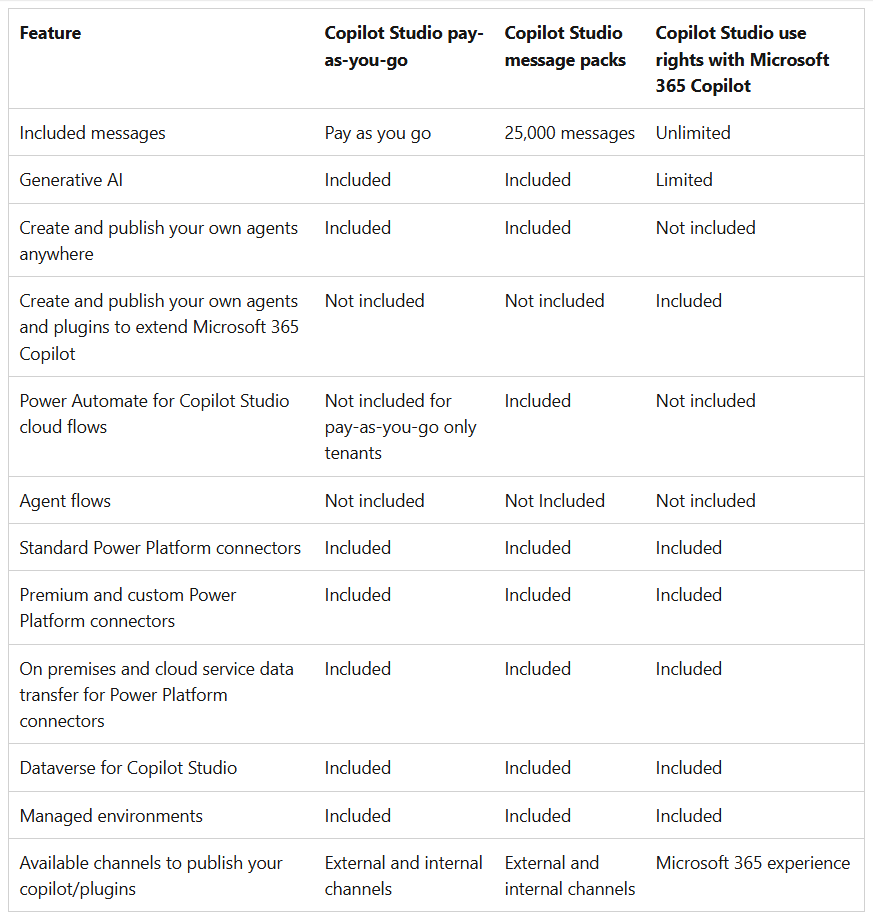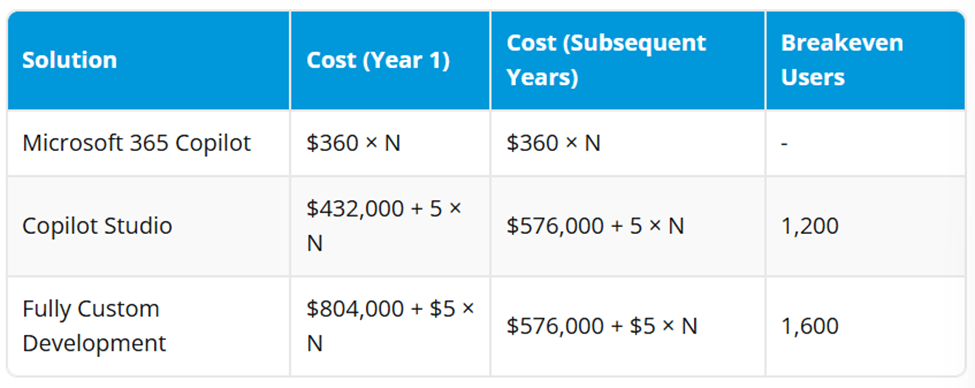

By now, most organizations using Microsoft technologies have already experimented with AI in some form. The question is no longer whether to use AI tools like Copilot, it’s about choosing the most effective and scalable approach based on business needs, technical maturity, and return on investment.
As organizations consider their next steps, it becomes important to understand the available options, and what each one requires in terms of access and investment. Access to tools like Microsoft Copilot and Copilot Studio typically comes through separate licenses or subscriptions, which vary depending on the level of customization, deployment model, and business needs.
For organizations in the Microsoft ecosystem, the options boil down to three paths, each of which may involve a different subscription or licensing model:
Each approach has its unique advantages and challenges, depending on the organization’s scale, needs, and goals which we’ll explore below.
This includes a breakeven calculation to give you an idea at what scale it makes sense to create custom solutions vs. buying the licenses.
Microsoft 365 Copilot is a generative AI extension built into Microsoft 365 apps, including Word, Excel, PowerPoint, Outlook, and Teams. It assists users with tasks such as summarizing email threads, generating presentation drafts, writing documents, and analyzing spreadsheet data.
According to Microsoft’s official documentation, Copilot uses advanced generative AI to streamline everyday tasks and improve organizational efficiency. Built on capabilities like natural language understanding and contextual insights, it enhances how users interact with familiar tools by making routine work faster, more intuitive, and more collaborative.
To use Microsoft 365 Copilot, organizations must have a qualifying Microsoft 365 plan. The Copilot user license is sold separately and can be purchased as an annual subscription or billed monthly, with costs starting at $30 per user per month for an annual commitment. The only difference between the monthly and annual plans is the billing frequency; all features remain the same. Licenses are managed through the Microsoft 365 admin center.
Pros:
Cons:
Best Use Cases:
Copilot Studio is a powerful tool within the Microsoft Copilot ecosystem that enables businesses to create, customize, and deploy AI workflows tailored to their needs. As highlighted on Microsoft’s Copilot Studio page, it empowers organizations with no-code and low-code interfaces for workflow optimization.
It offers a visual interface to design prompts, automate logic, integrate internal data sources, and extend AI functionality within tools like Microsoft Teams, SharePoint, and Power Platform. Premium connectors are available for advanced data integrations, enabling connections to external or premium services. The Power Platform Admin Center is used to manage, monitor, and assign Copilot Studio licenses and capacity, allowing administrators to track usage and enforce limits.
As of 2025, Copilot Studio supports features such as memory management, multi-turn conversation flows, and integrations with internal APIs. Solutions built in Copilot Studio can run securely within an organization’s Microsoft 365 environment and leverage enterprise connectors from Power Automate and Dataverse.
Capacity is allocated based on the type of license, and message count is tracked to monitor usage. The billing unit is typically based on messages or sessions, and usage is enforced according to the assigned capacity. Microsoft Copilot Studio pricing is structured around message volume or other units, with studio pricing tiers reflecting different usage levels and add-on options. Resources such as documentation and tutorials are available to help users understand pricing, capacity, and deployment.
Pros:
Cons:
Best Use Cases:

Organizations with advanced needs can build fully custom copilots using Azure AI Foundry, Microsoft’s platform-as-a-service for orchestrating, deploying, and managing enterprise-grade AI agents. Foundry integrates tools for prompt orchestration, agent memory, grounding with enterprise data, and model operations. Models such as GPT-4.5, GPT-4.1 series, and GPT-4o are accessible via Azure OpenAI Service.
Azure AI services offer flexible billing options, including pay as you go, so organizations only pay for what they use without upfront commitments. Additional capacity or licenses can be purchased as needed to support growing requirements. For large-scale or specialized deployments, organizations can contact Microsoft sales to request a custom proposal or pricing quote tailored to their needs.
This option supports the creation of copilots that go beyond general productivity tasks handling domain-specific reasoning, secure data access, and multi-turn interactions grounded in internal systems.
Pros:
Cons:
Best Use Cases:
Microsoft Copilot Studio offers deep integration with Azure AI Foundry, providing users with a comprehensive and flexible AI solution. This integration allows organizations to bring their own models from the Azure model catalog and apply them directly to their Copilot Studio topics, significantly enhancing the capabilities and relevance of their AI agents. Additionally, users can extend their agents by integrating vectorized indices from Azure Search, enabling more sophisticated data retrieval and contextual understanding.
With these capabilities, Microsoft Copilot Studio ensures that users can build AI agents that are not only powerful but also highly customized to their organization’s needs. The seamless connection between Copilot Studio and Azure AI Foundry means that businesses can leverage the full spectrum of Microsoft’s AI technologies to create, deploy, and manage advanced AI agents with ease.
To evaluate when it makes sense to move beyond Microsoft 365 Copilot licenses and invest in a Copilot Studio or fully custom solution, it helps to compare cost structures and break-even thresholds based on user volume, operational scope, and the number of tenants involved. The breakeven analysis below considers the total cost for each solution, including licensing, development, and operational expenses.
Disclaimer: Please note, the below calculations are overly simplified to give you a general idea of the ballpark timelines and costs.
Actual timelines and costs heavily depend on what you would like to achieve with your project and there could be a variance of up to 50%. Costs may also vary depending on the number of tenants and their specific usage patterns.
For example, if you would like to develop a much simpler PoC, it might cost only half what we have highlighted below. If you’d like a more accurate estimation, please reach out to us for a free consultation & estimation.
The below table represents a quick overview of the costs per solution and how many users you need for breakeven costs vs. buying plain licenses. Detailed calculations are shown below.

Setting these equal:
Setting these equal:
For organizations with over 1,000 users, Copilot Studio or fully custom development offers long-term cost advantages. Smaller teams or those seeking immediate deployment should consider Microsoft 365 Copilot for its simplicity and rapid integration.
Assess your scale, workflow needs, and budget to make the right choice. If you need support, reach out for a free consultation.
